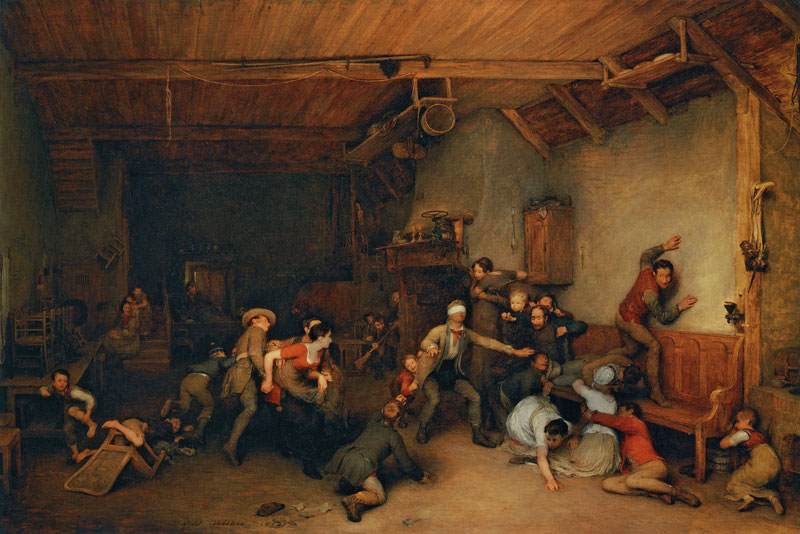New Year’s Day
Here’s a joyous New Year’s Day poem, written in the 1620’s or early 1630’s by carpe diem poet Robert Herrick. I like the way that he insists that we overlook all the bad news out there as we focus on Christmas greenery and feasting, which foreshadow “plenteous harvests” ahead.
Among those dangers we are to ignore are hostile parliaments Some 15 years are so after the poem was written, Parliamentary forces overthrew Charles I, and the Puritan republic that followed banned many of the festive Christmas traditions that Herrick celebrates. (See my post on how Charles Dickens’ Christmas Carol helped bring them back 200 years later.) So the poet who penned “gather ye rosebuds while ye may” is once again offering good carpe diem advice.
In fact he mentions rosebuds at one point in this poem. The “Liber Pater” or “free father” is Bacchus, god of wine, who makes our brains spin:
Sit crown’d with rosebuds, and carouse
Till Liber Pater twirls the house
About your ears…
Meanwhile, the “full twelve holidays” throughout which we are supposed to frolic are, of course, the twelve days of Christmas. So hang up your plow and harrow and pull out your bagpipes.
A New Year’s Gift
(Sent to Sir Simeon Steward)
By Robert Herrick
NO news of navies burnt at seas;
No noise of late-spawn’d tittyries;
No closet plot, or open vent,
That frights men with a parliament;
No new device or late-found trick
To read by the stars the kingdom’s sick;
No gin to catch the state, or wring
The freeborn nostrils of the king,
We send to you; but here a jolly
Verse, crown’d with ivy and with holly,
That tells of winter’s tales and mirth,
That milkmaids make about the hearth,
Of Christmas sports, the wassail-bowl,
That tost up, after fox-i’-th’-hole;
Of blind-man-buff, and of the care
That young men have to shoe the mare;
Of twelve-tide cakes, of peas and beans,
Wherewith ye make those merry scenes,
Whenas ye choose your king and queen,
And cry out: Hey, for our town green;
Of ash-heaps, in the which ye use
Husbands and wives by streaks to choose;
Of crackling laurel, which fore-sounds
A plenteous harvest to your grounds;
Of these and such-like things for shift,
We send instead of New-Year’s gift.
Read then, and when your faces shine
With buxom meat and cap’ring wine,
Remember us in cups full crown’d,
And let our city-health go round,
Quite through the young maids and the men,
To the ninth number, if not ten;
Until the fired chestnuts leap
For joy to see the fruits ye reap
From the plump chalice and the cup,
That tempts till it be tossed up;
Then as ye sit about your embers,
Call not to mind those fled Decembers,
But think on these that are t’ appear
As daughters to the instant year:
Sit crown’d with rosebuds, and carouse
Till Liber Pater twirls the house
About your ears; and lay upon
The year your cares that’s fled and gone.
And let the russet swains the plough
And harrow hang up resting now;
And to the bagpipe all address,
Till sleep takes place of weariness.
And thus, throughout, with Christmas plays
Frolic the full twelve holidays.
Added note: “Tittyries” are wild young men’s clubs. “Gin” I think is short for engine and means snare or trap. In other words, Herrick is inveighing against devious plotting and calling for straightforward and full-hearted celebration.
